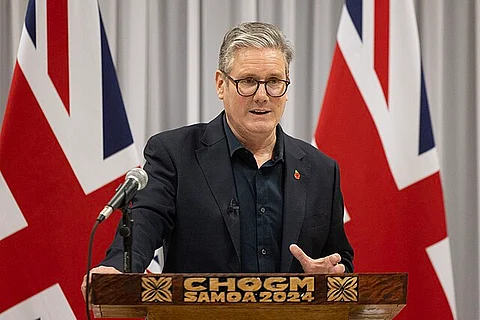

British Prime Minister Keir Starmer announced the UK will recognize Palestinian statehood at September’s UN General Assembly unless Israel immediately takes "substantive steps" to end Gaza’s humanitarian catastrophe. The conditions include: an immediate ceasefire, allowing full UN aid distribution, halting West Bank annexation, and committing to a two-state solution. This follows France’s similar pledge last week, positioning both Security Council members against Israel’s blockade policies that have caused "starving babies and children too weak to stand".
Israel furiously condemned the move as "a reward for Hamas," claiming it undermines hostage negotiations, a stance echoed by U.S. President Donald Trump, who called recognition "rewarding terrorism". The backlash highlights Israel’s growing diplomatic isolation as Gaza’s death toll surpasses 60,000 Palestinians, including 127 starvation deaths (85 children) since March. UN experts now accuse Israel of "using thirst as a weapon to kill Palestinians," noting 90% of Gaza’s water infrastructure is destroyed and 89% of households lack safe drinking water.
Starmer’s decision follows horrific reports from Gaza’s malnutrition clinics, where mothers described feeding infants "water mixed with tahini" due to Israel’s blockade on milk and formula. One 14-month-old weighs just 5.4kg (11.9 lbs); barely more than his birth weight while a 4-month-old weighs only 3.3kg (7.3 lbs). A UN-backed hunger monitor confirmed "the worst-case famine scenario is playing out" in Gaza, with Israel restricting aid trucks to 28 daily versus 500 pre-war despite global pressure.
Starmer’s reversal, after initially resisting recognition stems from overwhelming domestic pressure. 255 UK MPs (including half of Labour’s lawmakers) demanded immediate recognition, British public support for recognition outpaces opposition 3-to-1, with 5-to-1 backing stronger criticism of Israel and deputy PM Angela Rayner and Home Secretary Yvette Cooper privately lobbied Starmer to act. The UK has already taken concrete steps against Israel, including sanctioning far-right ministers Itamar Ben-Gvir and Bezalel Smotrich for inciting violence against Palestinians and suspending arms sales.
France’s Foreign Minister Jean-Noël Barrot hailed the UK’s move as pivotal for "breaking the endless cycle of violence" 8. While Germany remains hesitant, the joint Franco-British stance could trigger a domino effect among European nations. Recognition would raise Palestine’s formal UN recognition to 151 nations; 77% of the global community though skeptics note symbolism alone won’t end occupation. Critically, Starmer emphasized no Israeli veto will dictate Britain’s September decision: "We’ll make an assessment... but no one should have a veto". For displaced Palestinians like Diana Abu Jassem, watching her son wither without milk, the pledge offers fragile hope: "I appeal to countries abroad: Hear us. Please help".